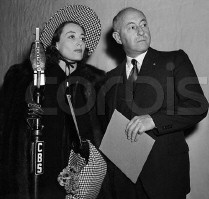 DeMille, Cecil B. (8/12/1881 - 1/21/59) Co-founder of Lasky Pictures (Paramount) in 1913, later producer of over 75 films, perhaps most famously 1923's The Ten Commandments. (He also appeared as himself in '50's Sunset Boulevard.) In addition, he also produced and hosted the Lux Radio Theater program from 1936 to 1945, on which Joan appeared with him 3 times. Says Joan in CWJC: DeMille produced spectacles, and he produced them well. Big and gaudy. They had a place in the industry, and they made money, but as far as real artistry is concerned I think you have to go back to 'big and gaudy.'
DeMille, Cecil B. (8/12/1881 - 1/21/59) Co-founder of Lasky Pictures (Paramount) in 1913, later producer of over 75 films, perhaps most famously 1923's The Ten Commandments. (He also appeared as himself in '50's Sunset Boulevard.) In addition, he also produced and hosted the Lux Radio Theater program from 1936 to 1945, on which Joan appeared with him 3 times. Says Joan in CWJC: DeMille produced spectacles, and he produced them well. Big and gaudy. They had a place in the industry, and they made money, but as far as real artistry is concerned I think you have to go back to 'big and gaudy.'
Desiderata. Meditation written in 1927 (copyrighted 1952) by Max Ehrmann. The word is Latin for "something desired as essential." Joan cites it in MWOL as an inspiration for finding peace of mind. It was read at her funeral service. The text:
Go placidly amid the noise and the haste, and remember what peace there may be in silence. As far as possible without surrender be on good terms with all persons. Speak your truth quietly and clearly; and listen to others, even to the dull and the ignorant, they too have their story. Avoid loud and aggressive persons, they are vexations to the spirit.If you compare yourself with others, you may become vain or bitter; for always there will be greater and lesser persons than yourself. Enjoy your achievements as well as your plans. Keep interested in your own career, however humble; it is a real possession in the changing fortunes of time.Exercise caution in your business affairs, for the world is full of trickery. But let not this blind you to what virtue there is; many persons strive for high ideals, and everywhere life is full of heroism. Be yourself. Especially do not feign affection. Neither be cynical about love; for in the face of all aridity and disenchantment it is as perennial as the grass. Take kindly the counsel of the years, gracefully surrendering the things of youth.Nurture strength of spirit to shield you in sudden misfortune. But do not distress yourself with dark imaginings. Many fears are born of fatigue and loneliness. Beyond a wholesome discipline, be gentle with yourself. You are a child of the universe, no less than the trees and the stars; you have a right to be here. And whether or not it is clear to you, no doubt the universe is unfolding as it should.Therefore, be at peace with God, whatever you conceive Him to be. And whatever your labors and aspirations in the noisy confusion of life, keep peace in your soul. With all its sham, drudgery and broken dreams; it is still a beautiful world. Be cheerful.Strive to be happy.
Die Mommie Die. Film written by and starring Charles Busch (based on his play of the same name), described by theNYTimes as a "sendup of Joan Crawford's late career as a horror movie star." Released October 31, 2003, in New York City and several other U.S. cities; shot in 18 days in June 2002. Busch received the 2003 Sundance Film Festival award for best performance in the lead role of "Angela Arden," and the film was chosen as the opening night selection at both the Miami and the San Francisco Gay and Lesbian Film Festivals. "Die Mommie Die" site.
Directors. Joan says in CWJC that the only four who ever helped or influenced her were Clarence Brown, Edmund Goulding, George Cukor, and Mike Curtiz. She added, re the role of the director in general:
I know that at this point in history it is very popular to give the director all the credit, and to minimize the script, the actors, and everyone else involved in production. This a cult thing that started in Europe, where the director did have absolute control because often he was also the producer and the writer and the guy who'd gotten the money together to make the picture in the first place.
Maybe this was true, in the very early stages, in this country, when a few men like Griffith and DeMille were more concerned with making art than making money. But the studios weren't interested in art unless it also made money, so the total emphasis was placed on turning out movies, like a factory operation, the public would pay to see...throughout the greater part of my career the director was less important than the cameraman or the gopher. This sounds like heresy, but I think it's true.
During the day of the big studio the money to make a film was supplied by the studio and whatever arrangements they made with banks. The producer involved was there to make sure the product pleased Louis B. Mayer. The director was on the job to please that producer. He had a snowball's chance in hell of doing anything that wasn't commercially kosher. So you can see how the director, until [Irving] Thalberg came along and shook things up a little, had the authority of a hamster... most of the directors I had during my first century at Metro had very little imagination, and I doubt that they could have done more than they did even if they hadn't been restricted. They were salaried employees, not creative persons, and their main duty was to get the picture done on time and within budget..
Robert Altman's films are usually terrible, and so are Stanley Kramer's, and Bogdanovich--my God, I haven't heard the phrase for years, but "artsy-fartsy" does it. They seem to be the prima donnas of filmmaking, but Christ, they're not Bergman. I think they'd be a hell of a lot more honest if they gave credit to the scriptwriter...and the actors who brought it to life. And the cameraman. And whoever is hired to edit. The whole goddam industry has forgotten the fact that a film is a team effort, and the public has swallowed this line. I don't think a really honorable director, like George [Cukor], would ever say, "This film is all mine." But most directors today seem to want to be little tin gods. It just isn't logical.
Disney World. Looking for Joan references while visiting Orlando's Disney World? Here's a recent (Sept. '07) in-depth report from a Joan and Disney fan (thanks, LG!):
I recently returned from my annual pilgrimage to Walt Disney World where I was on the lookout for references to Joan. The Disney-MGM Studios (to be renamed Disney's Hollywood Studios on January 1) has, appropriately enough, the most Joan material. There is a portrait of Joan that hangs prominently in the lobby of the Hollywood Brown Derby restaurant and I saw a picture of Joan from Rain hanging in a store at the park. There is also a plaque at the entrance to the Great Movie Ride commemorating her Oscar for Mildred Pierce. As for the ride itself, we get a brief glimpse of Joan in Our Dancing Daughters during the film montage at the end.
One of my favorite stores at Disney World is Sid Cahuenga's One-of-a-Kind, located in a bungalow just inside the entrance to Disney-MGM Studios. The shop offers original Hollywood memorabilia, such as autographs, photos, movie posters, and small props. This was the first time that I have visited the shop and they did not have anything pertaining to Joan. The clerk told me that she had sold an autographed photo of Joan earlier in the week.
Don the Beachcomber's. Eatery in Hollywood frequented by Joan (and daughter Christina's favorite place for dinner as a child).
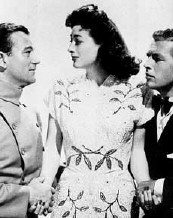 Dorn, Philip. (9/30/1901 - 5/9/75) Born Hein van der Niet, this Dutch actor's film career lasted from 1934 to 1953. (A stage injury in '55 forced his performing retirement.) A film idol in Holland and Germany, he came to the U.S. during World War II, later retiring in Holland. He co-starred with Joan in 1942's Reunion in France. The two had had an earlier fling and during their scenes together here, an uncomfortable Joan constantly moved out of frame so that they wouldn't appear in the shot together. (See the Jules Dassin entry for a more complete account.)
Dorn, Philip. (9/30/1901 - 5/9/75) Born Hein van der Niet, this Dutch actor's film career lasted from 1934 to 1953. (A stage injury in '55 forced his performing retirement.) A film idol in Holland and Germany, he came to the U.S. during World War II, later retiring in Holland. He co-starred with Joan in 1942's Reunion in France. The two had had an earlier fling and during their scenes together here, an uncomfortable Joan constantly moved out of frame so that they wouldn't appear in the shot together. (See the Jules Dassin entry for a more complete account.)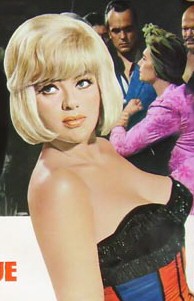 Dors, Diana. (10/23/31 - 5/4/84) British sex-bomb and Joan's co-star in 1968'sBerserk! In her 1979 autobiography Behind Closed Doors, Dors wrote of Joan:
Dors, Diana. (10/23/31 - 5/4/84) British sex-bomb and Joan's co-star in 1968'sBerserk! In her 1979 autobiography Behind Closed Doors, Dors wrote of Joan:
She was an incredible character, strange and puzzling, but whatever else a 'superstar' in her profession! As stated earlier, we worked together once in a film, and I can only speak from experience, beneath the dignified, strong exterior was a frightened, lonely woman. The stories criculating now about Joan Crawford, with the advent of the book written by her adopted daughter entitled Mommie Dearest, do tarnish the image a great deal and I find it hard to believe that the same woman who was concerned enough about me to telephone from America, when I nearly died of meningitis [my note: in 1974], is the same one who was capable of being such a monster to her children. All these terrible tales are possible however if she really was an alcoholic as we are led to believe, and from the various situations I witnessed on the set of the film we made, I am inclined to feel they are true.
Despite these there was humour to be found on some occasions. Producer Herman Cohen received an urgent call to her dressing room one day. 'Tell Miss Crawford I am just in the middle of a production meeting,' he said to his secretary, but back came the message that he had better do as he was commanded if he wanted the film to continue. Alarmed as to what the problem might be, Herman hurried to her room and found a thunderous Joan.
'Whatever is wrong?' he asked anxiously, and the whole story unfolded. As a director of the enormous Pepsi Cola firm, a role she had taken on after the death of her fourth husband Alfred Steele who had originally held the position, Joan decided that everyone on the film should drink as much of the stuff as possible, so she had graciously installed Pepsi Cola machines all over the studio.
'This gesture has been abused,' she announced to a trembling Herman that day.
'But I don't see what the problem is Joanie,' he cooed in his most sympathetic voice.
'The problem is,' screamed La Crawford, ' that out of the goodness of my heart I have arranged for everyone on this movie to drink Pepsi Cola free and they are treating me with scorn!'
'But Joanie dear,' Herman replied, pretending that even he drank the fizzy concoction himself, ' they all love you for it, and they are so grateful, so what is wrong?'
'I'll tell you what's wrong,' she snapped. 'No one is doing me the courtesy of bringing back their empty bottles.'
I do not know exactly how Herman soothed her feathers for she was obsessed by thrifty behaviour, such as saving flower vases which had contained blossoms sent to her, washing them out personally, and flying them back to New York in her luggage. The question then of others saving their empties, and returning them, was obviously a major issue in her mind, and I suspect Herman must have promised on oath that instructions would be sent out to everyone that the bottles must be returned on pain of death! After this confrontation not one empty Pepsi Cola bottle was ever seen lying around the set again.
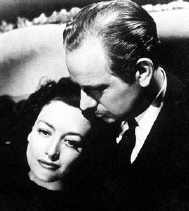 Douglas, Melvyn. (4/5/01 - 8/4/81) Co-starred with Joan in '38's The Shining Hour, '41'sA Woman's Face, and '42's They All Kissed the Bride.
Douglas, Melvyn. (4/5/01 - 8/4/81) Co-starred with Joan in '38's The Shining Hour, '41'sA Woman's Face, and '42's They All Kissed the Bride.
Said Joan in CWJC about his work in "Face":
Great thanks to Melvyn Douglas; I think he is one of the least-appreciated actors the screen has ever used. (Where would Garbo's "Ninotchka" have been without him?) His sense of underplay, subordination, whatever you call it, was always flawless. If he'd been just a little handsomer, a bit more of the matinee idol type, he'd have been a top star. IMDb info.
Douglas, Mike. Joan appeared on The Mike Douglas Show on several occasions, including 9/24/68, when she came on with Christina to promote the just-released Films of Joan Crawford book. Said Douglas about Joan:
Joan Crawford was an ideal guest. A lovely lady with fascinating stories. After several appearances, she was comfortable enough to bring along her daughter, Christina, an aspiring actress. It was another good show, with lots of happy family talk. Years later that prompted me to give a guest a pretty rough time for one of the very few times in my career when Christina Crawford was scheduled to promote her tell-all book about her mother. Mommie Dearest was not just an unpleasant breakthrough in publishing, precipitating an avalanche of sordid family exposes. I only knew Joan Crawford from her movies and her appearances on the show, but I didn't like the book. I'm old school enough to still believe in family loyalty and the value of discretion when it comes to dirty laundry. I remembered Christina's apperance ten years before, when her mother tried to give her career a boost. Now, she was back with a vengeance and the horror story of a mother from Hell.
Douglas, William O. U.S. Supreme Court Justice. He makes it into Joan-lore because of his 23-year-old wife, Cathy Douglas, whom Joan apparently blatantly snubbed during a White House dinner on January 17, 1967.
Doyle New York. NYC auction house that sold 80 lots of Joan items for $135,392 on 12/7/11. (Her Golden Globe was the highest-selling item, going for $25,000.) See the complete list of items sold.
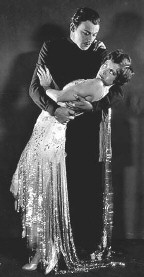 Dream of Love. MGM silent, 1928. Directed by Fred Niblo, 65 minutes. Joan plays a gypsy, "Adrienne," with whom a prince (Nils Asther) is smitten. Says Joan in CWJC: ...a mess--a bad script, no direction, no story worth mentioning.
Dream of Love. MGM silent, 1928. Directed by Fred Niblo, 65 minutes. Joan plays a gypsy, "Adrienne," with whom a prince (Nils Asther) is smitten. Says Joan in CWJC: ...a mess--a bad script, no direction, no story worth mentioning.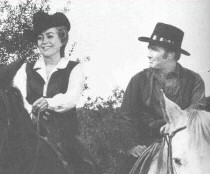 Drury, James. Joan's co-star in the "Nightmare" episode of TV's "The Virginian," which aired 1/21/70.
Drury, James. Joan's co-star in the "Nightmare" episode of TV's "The Virginian," which aired 1/21/70. Duane Reade. National drug-store chain. In the spring of 2010, a Joan quote appeared on the wall of their NYC Chelsea district store's makeup wall: "I have always known what I wanted, and that wasbeauty... in every form." (Thanks to Hart for the photo.)
Duane Reade. National drug-store chain. In the spring of 2010, a Joan quote appeared on the wall of their NYC Chelsea district store's makeup wall: "I have always known what I wanted, and that wasbeauty... in every form." (Thanks to Hart for the photo.) Duke Steps Out, The. MGM silent, 1929, starring William Haines. Directed by James Cruze, 62 minutes. Joan plays "Susie the Co-ed," whom millionaire-son-turned-boxer Haines tries to woo. Says Joan in CWJC: Metro was building Bill Haines then, and this picture was created strictly for him. I might as well have stayed home.
Duke Steps Out, The. MGM silent, 1929, starring William Haines. Directed by James Cruze, 62 minutes. Joan plays "Susie the Co-ed," whom millionaire-son-turned-boxer Haines tries to woo. Says Joan in CWJC: Metro was building Bill Haines then, and this picture was created strictly for him. I might as well have stayed home. 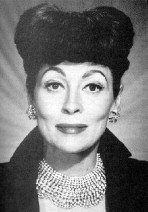 Dunaway, Faye. (1/14/41 - ) Said Joan in CWJC of the '70s crop of up-and-coming stars: "...only Faye Dunaway has the talent and the class and the courage it takes to make a real star." Ahem. Anyhow, Dunaway's a deservedly acclaimed actress for roles in such films asBonnie and Clyde and Barfly, but will probably be forever noted for her weird kabuki-esque take on Joan in 1981's Mommie Dearest. In the March 1990 issue of Ladies' Home Journal, Dunaway admitted that she "overdid" Joan and also said:
Dunaway, Faye. (1/14/41 - ) Said Joan in CWJC of the '70s crop of up-and-coming stars: "...only Faye Dunaway has the talent and the class and the courage it takes to make a real star." Ahem. Anyhow, Dunaway's a deservedly acclaimed actress for roles in such films asBonnie and Clyde and Barfly, but will probably be forever noted for her weird kabuki-esque take on Joan in 1981's Mommie Dearest. In the March 1990 issue of Ladies' Home Journal, Dunaway admitted that she "overdid" Joan and also said:
That film was career suicide. It turned into an exploitation movie that verged on camp, and I'm still recovering from it. Going in, the role seemed tricky and interesting. I said "yes" because I listened to advice from someone in my private life - the last time I'll ever do that.While making Mommie Dearest, I woke up with nightmares about her...